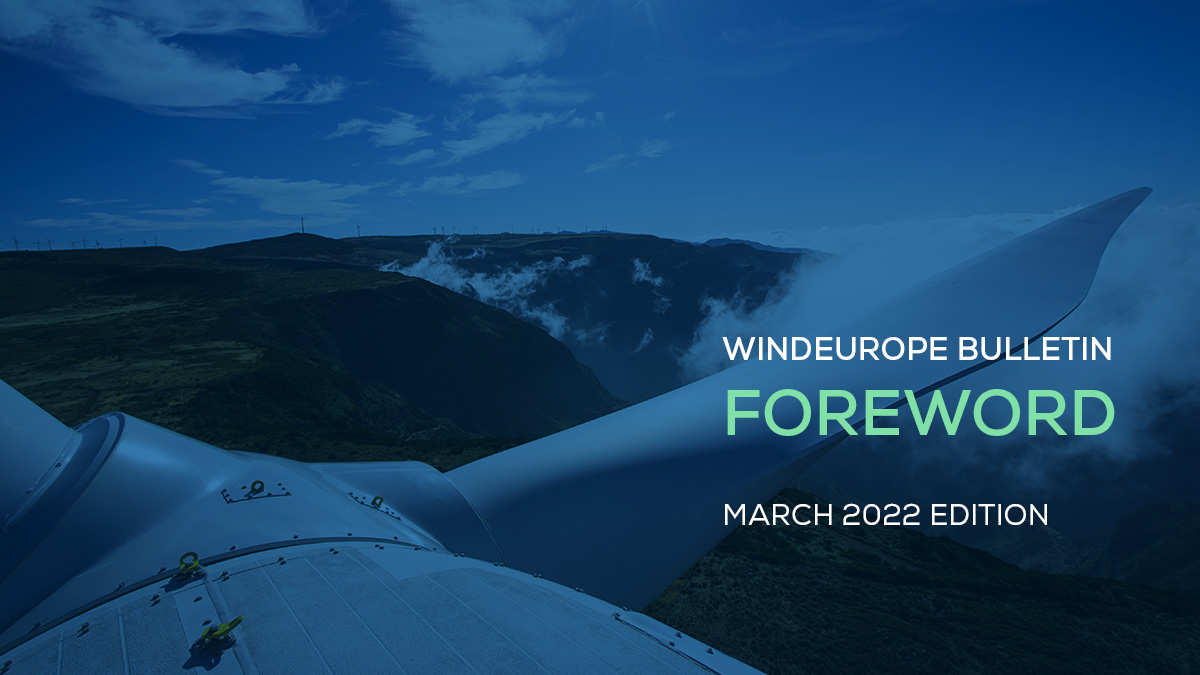News
WindEurope CEO on Ukraine and the implications for Europe’s energy policy

14 March 2022
CEO Foreword
Dear WindEurope Member,
The events of the last few weeks have shocked and saddened all of us in the wind energy community. As an industry that has companies, partners and colleagues in Ukraine, we stand in solidarity with the Ukrainian people in the face of Russian aggression.
Our colleagues who run the Ukrainian Wind Energy Association, Andriy and Galyna, are in Poland and being supported by the Polish Wind Energy Association. The other member of their staff, Kateryna, is serving with the volunteer force in Kyiv.
Many of you have been reassessing your exposure to Russia and Russian interests. If you want any advice or guidance on this, feel free to contact us. For now neither the EU nor any national Governments have asked us to take a common stance or approach as an industry.
But the EU are keen to know how we’re being impacted as an industry, and we’re sharing with them the implications for our supply chain and what it may mean for the ongoing development of new projects.
At the same time, as you will have seen, the EU has taken immediate and significant steps to adjust European energy policy. Energy policy is now security policy. And with that in mind, this week the EU Commission released its ‘REPowerEU’ plan to cut Russian gas imports by 2/3 by the end of this year. And to end all Russian fossil fuel imports by 2027.
That means diversifying gas imports of course. And, crucially, ramping up our domestic energy production, not least wind energy. The European Commission want more wind: 480 GW by 2030 up from 190 today, that’s 30 GW on top of what the Green Deal had envisaged. And they want faster deployment in the coming months.
This is going to be a challenge as we’re currently building only half of what Europe needs to deliver the Green Deal – see our 2021 stats and 5-year outlook here. Our message to Governments: we want to deliver this, we have the technology, the finance is available, and the supply chain can ramp up – though it’s dealing with some disruptions and higher costs. The key is to accelerate the permitting of all the good projects out there that are ready to be built.
And the Commission get this. They are moving forward to May their guidance to National Government on how to accelerate permitting – it was originally planned for the Summer. And the Commission have stressed that renewables need to be considered as being in the overriding public interest.
REPowerEU also addresses how national Governments should deal with high energy prices. The European Commission set out clear conditions national Governments must follow if they apply claw back measures to tax what they consider to be “windfall profits”. The Commission spell out clearly that these measures can’t be retroactive, they can’t apply to any electricity sold forward – for example in PPAs or bilateral contracts. They can’t mess with the wholesale electricity price signal. And crucially, they need to be limited in time and done under clear pre-defined conditions.
The Commission are also now saying that they need to consider adjusting Market Design and the price-setting mechanism. The Agency of European Energy Regulators will come out with a very important report on this next month.
This is getting the attention at the very top. Heads of States and Governments of the EU-27 met in Versailles to discuss their response to the Ukraine crisis. They endorsed REPowerEU. And gave a mandate to the European Commission to present options for emergency measures to limit what they call the ‘contagion effect of gas prices in electricity prices’, including temporary price limits. And by mid-May Heads of States and Government want the Commission to make proposals to optimise the electricity market design to deliver climate neutrality while ensuring energy security.
With all this to consider we’re now looking ahead to our Annual Event in Bilbao from 5-7 April. And in light of recent news, the event itself will have a very clear focus – energy security in Europe, and how we can deliver it. We’ll be joined by key speakers from Governments, technology, finance, industry and elsewhere, discussing among other things:
- How to simplify permitting rules and procedures;
- Ensuring the Green Deal is “made in Europe”;
- The right energy market design to drive the huge investments needed;
- Developing the grid to integrate more renewables;
- How to scale up renewable hydrogen;
- The imminent “take-off” of floating offshore wind; and
- Ensuring happy co-existence with local communities and other interests, both on land and sea.
The programme is available here – click on each session title to see the agenda and guest speakers. And you can register here – there won’t be onsite registration, so you need to register online beforehand.
This is a crucial juncture for us as an industry. Together with other renewables, we need to step up and fill the gap as we reduce fossil fuel imports. By committing to deliver the Green Deal we’re not just accelerating the energy transition. We’re helping to provide energy security, prosperity, and opportunity for Europeans.
Take care,

Giles Dickson
Want to read more and receive our regular newsletters?

